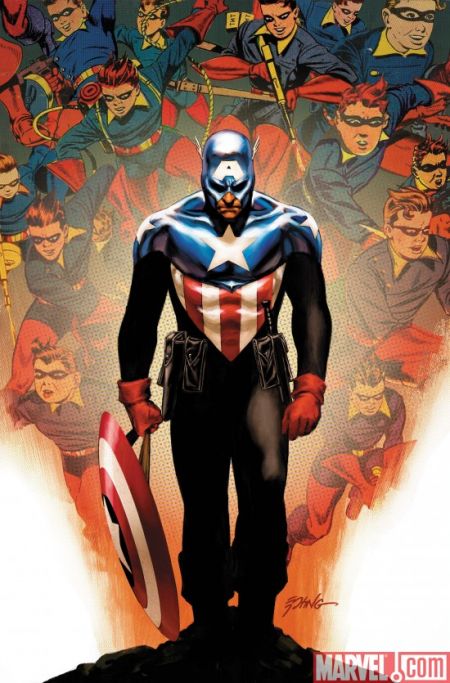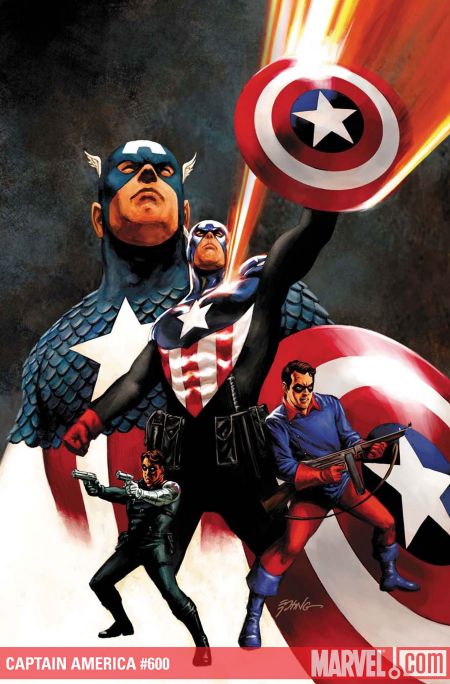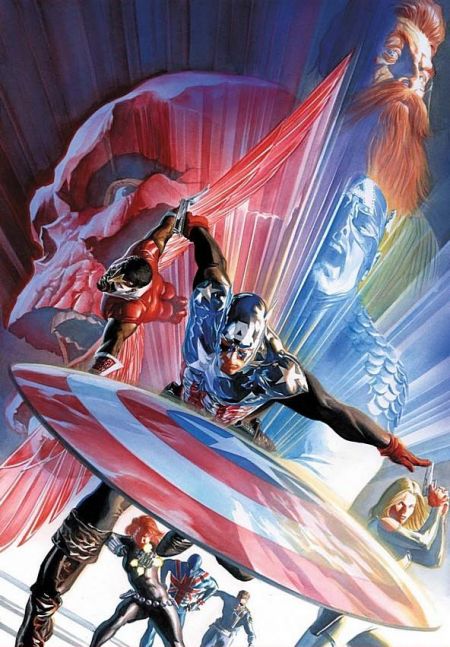Captain America #50
By Andy Frisk
May 20, 2009 - 20:33
Marvel Comics
Writer(s): Ed Brubaker
Penciller(s): Luke Ross
Inker(s): Rick Magyar, Luke Ross
Colourist(s): Frank D’Armata
Letterer(s): VC’s Joe Caramagna
$3.99 US
 |
The flashback stories are a mixture of comedy and drama with the storytelling leaning, obviously, more heavily toward the drama side considering Bucky’s troubled psyche and past as well as the appearance of his deceased friend and mentor, Steve Rogers. The story of Bucky’s 18th birthday is particularly good with the strongest humor involving Cap, Bucky, The Human Torch and his sidekick, Toro.
The depiction of Bucky as Captain America remains unique, and his fighting style, in this issue particularly, stands out in pretty sharp contrast to Rogers’. This Captain America takes full advantage of his unique weapon, the ever present star spangled shield, but draws and fires his sidearm when necessary too. No matter how many times we’ve seen Bucky in action as the new Captain America, when he pulls that pistol we’re reminded just how different the two are. The difference is striking, but the image of America, present and World War II era is strikingly different as well, so why wouldn’t the metaphoric embodiments of the two, Steve Rogers and Bucky Barnes, be as different also?
 |
Ross’ pencils are great as usual, but it really is the coloring of Frank D’Armata that makes the artistry of Captain America stand out. The blurred movement and explosions convey a sense of movement that is quite realistic, lending the artwork an almost photo-realistic quality. The shots of the sky with their incredibly realistic looking clouds, reflecting the light of the evening sun which backdrop the Watchdog agents in their flight suits, conveys an even more powerful sense of a photo-realism-like atmosphere. The combined and finished product of Ross’ pencils, Magyar’s and Ross’ inks, with D’Armata’s colors, makes Captain America one of the most interesting books, artistically, being published right now.
 |
The issue contains, after the story proper, a short bio of Roger’s life as well as his adventures from the time he was administered Dr. Erskine’s super soldier serum up through his death and Bucky’s eventual assumption of the mantle of Captain America. It’s pretty unexciting and unnecessary, but serves as a brief history for any readers who might have picked up Captain America #50 because it’s a “milestone” issue and were wondering just who this Bucky character was, etc. With next issue going back to original numbering, it will be the 600th issue published as a monthly Captain America title since his inception, much like Thor did a few months ago, next month’s issue looks to be the real milestone issue. As long as the quality displayed in issue #50 holds up, Captain America will remain a strong read, no matter what the issue numbering system is.
Rating: 9/10
Related Articles:
Captain America Series 1 Marvel Legends Review
Hail Hydra Captain America Kitbash
Marvel Legends (Toybiz) Series 8 Classic Captain America (2004)
Captain America John F. Walker
Captain America First Avenger
Gamerverse Stealth Captain America
VIZ Media Announces "Captain Tsubasa" on Cartoon Network Latin America
Generations: Sam Wilson Captain America & Steve Rogers Captain America #1 comics review
Sam Wilson Captain America #17
Steve Rogers: Captain America #1
